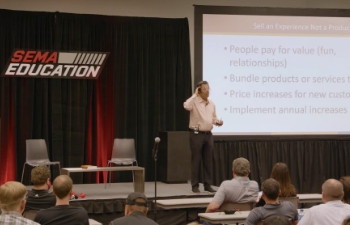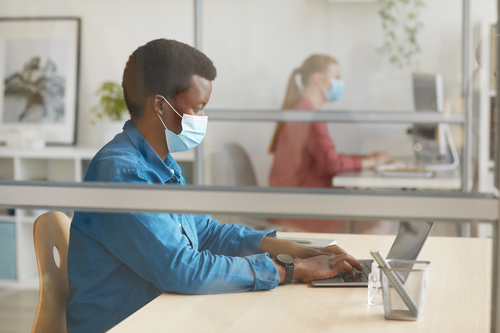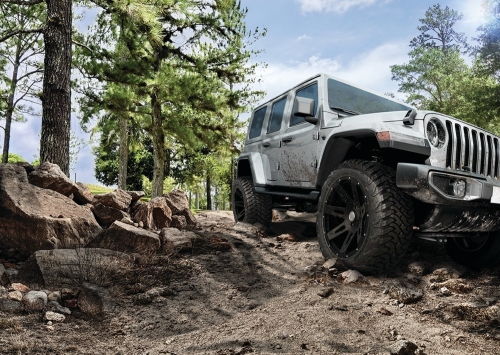SEMA News—November 2020
BUSINESS
Best Practices: Marketing in the COVID-19 Environment
Q&A With Kyle Fischer, Hot Shot’s Secret Director of Sales
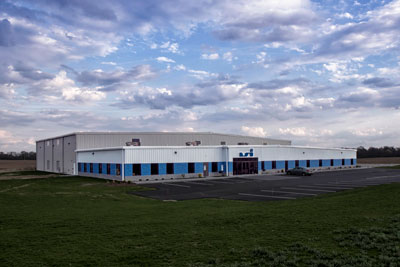 Located in Mt. Gilead, Ohio, Hot Shot’s Secret has plenty of open space for growth. It’s a good thing, because with business booming, the medium-size company is already at work on an expansion of its 30,000-sq.-ft. facility. |
Founded and owned by Chris Gabrelcik, Lubrication Specialties (also known as Hot Shot’s Secret) manufactures industrial-grade lubricants and additives designed to improve engine performance in both professional and everyday consumer applications. Located in Mt. Gilead, Ohio, just north of Columbus, the company has outgrown three buildings in the past eight years and now is headquartered in a 30,000-sq.-ft. production warehouse set to double in size in the coming year.
While the manufacturer cut its teeth on diesel formulations, the company has since broadened its product line to address gasoline engines as well. It supports motorsports teams, jobbers, brick-and-mortar operations as well as its own direct-to-consumer sales.
“We’re a medium-size company, but it’s actually worked to our benefit,” said Hot Shot’s Secret Director of Sales Kyle Fischer during a recent SEMA News interview. “We’re big enough that we do everything in-house, from R&D to blending, bottling and packaging, and we’re now carried in more than 25,000 retail stores nationwide and sold internationally, but every bottle comes out of our facility right here in Ohio. I like to say we’re big enough to pull off really big things, but we’re small enough that we’re versatile, and we can really get products to market quicker than some of the big guys can.”
That versatility and entrepreneurial spirit paid off as the recent COVID-19 pandemic spread to the United States. First it allowed the company to quickly pivot in support of local first responders and then to pivot again to address the suddenly changing needs of its consumers. As part of our efforts to highlight and share successful best practices, SEMA News offers the following takeaways from our interview with Fischer, edited for clarity and brevity.
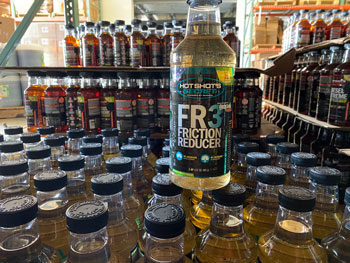 The company cut its teeth on industrial-grade lubrication and additive solutions for the diesel market but quickly expanded to gasoline-engine products as well. Its products are formulated to appeal to motorsports professionals, jobbers, retailers and everyday commuters. |
SEMA News: Before we discuss the company’s success in the COVID-19 environment, can you tell us about the Hot Shot’s Secret customer mix? Who’s your market?
Kyle Fischer: We really came up and made our name in the diesel market. We originally had two real big groups of consumers, which would be your everyday driver who owns a diesel or may have, say, a lawn-care business that uses the diesel for his business, right up to large fleet businesses with over-the-road trucking kind of stuff. Yet we have products for gas, diesel, you name it.
In recent years, as our brand has grown, we’ve had a lot of success in motorsports. That’s become one of our bigger customer categories now, and that exposure brought us into the marketplace to your everyday driver. It’s allowed us to leverage our brand into all of the major auto retail stores, so we’re seen everywhere now.
SN: Turning to the COVID-19 situation, how would you characterize its impact on the company since March?
KF: We saw the start of the slowdown, if you will, from the consumer side, just like everybody else did. We sell on our website, direct to the public, in brick-and-mortar stores across the nation; and we also have a direct-sales department that sells to independent dealers nationwide.
The web sales started to slow down first, which is your biggest indicator from the consumer side—it’s like a direct touch to the consumer—and then we started seeing the retail end and our independent dealer site start to slow down a little bit, so we knew that there was a lot of uncertainty in the marketplace. It was something that we had to look at, forecast, and come up with a game plan to go forward.
SN: Hot Shot’s Secret came up with an interesting solution, though. Please tell us about your company’s response to the situation.
KF: We’re very fortunate here. Our owner, Chris Gabrelcik, is one heck of an entrepreneur. Where most people see a challenge, Chris likes us to think of it as an opportunity, so we looked at the marketplace and [asked], “How can we supplement our business? What opportunities are out there?” We like to be grateful for what we have and to think of how we can help others.
At the time, there was a huge demand for hand sanitizer, and we specialize in blending, in our chemistry, in our R&D. We have a staff [of experts] here whose job is to formulate chemicals, and those energies are usually spent toward the automotive market. However, you look around and you work with what you have, and we said, “Well, we’ve got plenty of bottling lines here and capabilities of blending and packaging.”
Chris is always looking to do stuff locally. This is a community he’s grown up in, so he said, “Let’s first take care of our locals.” We got the facility approved by the FDA to produce a formula of hand sanitizer that was approved by the World Health Organization (WHO) and the Centers for Disease Control and Preventioon (CDC).
At first, I think we manufactured 300 gal. in 4-oz. bottles, and we donated all of that to our local hospitals, police, fire, retirement homes, schools, nurseries—places that really needed it. At first, we didn’t offer it for sale; we had no intentions of going into that industry. But once word got out, the phone calls [from potential consumers] didn’t stop, so we got together and we said it’s an opportunity; we’re fortunate to have the capability to do this; and we can help fulfill a need right now. It also was supplemental revenue when we were looking at a slowdown in our normal revenue stream, so we went ahead and cranked up full production. We went from a 300-gal. plan to—oh, man—probably millions of gallons at this point. It really took off like wildfire.
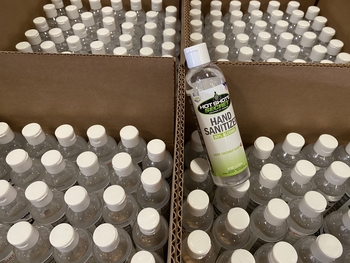 The company’s hand sanitizer is a success story in its own right. First manufactured for donation to local first responders and caregivers, word of the product quickly spread to consumers across the United States and helped sustain the company during the COVID-19 lockdowns. |
SN: Besides launching the hand sanitizer, we understand that you also adjusted your marketing approach. What did
you change?
KF: This really comes down to just being creative with your business during very tough times. We formulate oil and fuel additives that we take a lot of pride in, and our tribology and our R&D department formulate really good products. It becomes a marketing challenge when we have to sit down and create a marketing plan and decide which benefits of this product are the most marketable, if you will. How do we reach the customer? What is the
customer looking for?
Often we have products that are fully formulated that do five or six things. We have everything in one bottle to give you a cetane boost, a moisture dispsersion, a lubricity agent, an injector cleaner, a fuel stabilizer—all in one. In a normal environment, people might be looking to keep their injectors clean, so that leads our marketing on the product.
We had to reevaluate where the consumer is right now. People are out of work or working from home. They’re traveling a lot less, if at all—maybe a once-a-week trip to the store—so we can’t market our product the same way. We had to creatively look at the features and benefits of our products and see how they can help consumers in today’s very strange environment, so we’ve adjusted our marketing to educate. We’re always about educating our consumers, because tribology in oil and in fuel is a very difficult thing to explain in a 30-sec. advertisement.
SN: What does that education consist of?
KF: One important thing to get people to understand is that they need to consider fuel stabilization, since their cars are now sitting longer, and that’s something that they never thought of before. They might be starting up the car once a week and going on a short drive, so let’s educate them on what that’s doing to the internals of the vehicle and the fuel pump, the injectors, and how we can help them at this time. The last thing they want now is another vehicle problem on top of an epidemic out there.
That’s just one example. Another would be on the oil side—how oil still gets acidic as it sits. When you’re normally traveling so many miles a month, you’re normally changing your oil every couple of months, depending on how much you travel. Now, all of a sudden, the vehicle has been sitting in the garage or the driveway for half the year and doesn’t have 1,000 mi. on it. Should I even be changing my oil?
It brings up those types of questions, so we have the same great products we’ve had, but there’s been an alteration in how we position the products and market them to educate consumers in a new environment. [We’re helping them understand] how those environmental factors affect our products and how they’re used.
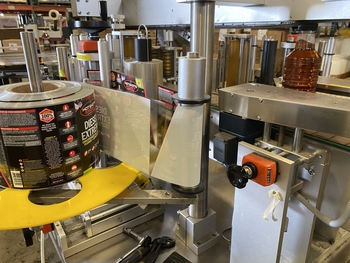 From R&D to blending, bottling and packaging, Hot Shot’s Secret does everything in-house. Because its formulations offer several “all-in-one” consumer benefits, the company was able to readjust its marketing messages to meet the changing needs of a COVID-19 environment. |
SN: How are you getting your messaging out in this environment? Web, print, social media?
KF: We’ve really turned up the wick a lot on digital, including social media and even some e-mail campaigns. Our marketing research has shown us that [consumer] time spent online and your digital reach go a lot further in this environment, because people are at home in front of their computers, and they’re—I hate to put it—bored.
Facebook has been the biggest surprise to me as the most successful. I hinted at it earlier that we have a very difficult product to explain. We actually try to look at how deeply we can go with our marketing channels. I’ll take fewer eyeballs but a longer ear any day of the week.
We’ve also restructured and are still in the process of really developing more content that’s less promotional and more educational, and that’s centered marketing as well. We love it because we’ve always preferred it to have it this way. We put up a lot of “sciencey” stuff on our Facebook and YouTube channels. It isn’t the real flashy, fun stuff like videos of our race cars that people like and share on social media. Instead, it’s things like actual breakdowns of oil viscosity shearing and how it happens in your motor, and we’ve found a more attentive audience for that in the past six months than we have in the past six years.
SN: How about your connections with the rest of the aftermarket industry now that the 2020 SEMA Show is cancelled? What adjustments are you making in that regard?
KF: We were really bummed when we got the news about the SEMA Show. This was going to be our first year at the Show. We had a booth in Central Hall, and we were really looking forward to it. We have historically always been at AAPEX next door, but this was going to be our SEMA Show debut, and that was a hit that was tough on us.
From a promotional aspect, as I mentioned, we’re very science-based and like to put that out there. We also like to improve on our products at the most extreme levels, because, at the end of the day, we’re selling to everyday drivers to protect their investments in the driveway. Motorsports has really become an area that has allowed us not just to prove our products but also feed our R&D department to develop new products and advance our products, all while capturing a very attentive audience that is enjoying a drag race, or a sled pull or an endurance race.
I think the challenge is that a lot of motorsports events and races have been cancelled, just like the SEMA Show. It’s a confusing environment from one state to another, but we’ve had a few big races in a row. That has allowed us to double down on the events that we’ve been able to get in, and the streaming views and the sharing of these types of things on our social-media platforms are getting a lot more reach than ever before.
SN: How has that gone for your company? Where are you in terms of sales at this point in the year?
KF: Right now, we’re absolutely booming, and it has been quite a wild ride. I’ll never forget 2020, I’ll tell you that much. I know there are a lot of companies hurting and that have folded and a lot of families that are hurting. We manufacture a product that can also be hurt when there’s not as much driving. We’re an automotive product, so when driving ceases, we usually see a downturn.
When the hand sanitizer game plan came into play, it really supplemented those first couple of months. Number one, there was a huge need for hand sanitizer. Number two, we had a real slowdown on the oil and additive side of the business.
Just due to the confusion and not knowing [what would come] next, March and April were question marks—like where are we going? But by the end of May, and certainly once we were into June, we started seeing numbers going up first in the retail side. That was a good indicator to us as saying, okay, people are finally getting back out. They’re taking those weekly trips not just to the grocery store, but they’re also stopping by the auto parts store and they’re picking up some items, and this gave us an opportunity.
SN: There are a lot of companies reporting a rise in online sales, but it’s really interesting to hear that brick-and-mortar has also been a good channel for you.
KF: Absolutely. That was the canary in the coal mine for us. I think there’s some light here at the end of the tunnel, and people are getting out and getting active again, and they’re working on their vehicles again. It’s exciting, and we saw that before we saw the web picking up. We had good support for our sales through our hand sanitizer, of course, but the oil and the additive side of the business followed the brick-and-mortar sales, so it was an interesting dynamic.
We had a hunch that a lot of people were knocking out some of those automotive projects at home. Now everyone’s done their spring cleaning and is saying, “You know what? I might pick up that old car project that I’ve been putting off for a long time, or I might do some maintenance on my cars myself, since I have some time to kill and I’m here at home.”
That thought was backed up with the growth in our sales from our retailers, and it was proven by the end of June. Since then, we’ve had record-high retail sales numbers—higher than our company has ever seen—and I can only credit it to the fact that people are home using the extra time that they have to pick up some of these automotive projects.
I think it also ties back into how people are consuming our information. A lot of the educational stuff we’re putting out is how-to stuff based on automotive [maintenance and projects]. Those are the types of things we found—and we’re hoping we’re smart enough to think that through—that people are consuming and then going to the retail store and saying, “You know what, I usually stop by a Jiffy Lube to get my oil changed, but I might change the oil myself. I might add some additive the next time out, or I might try this product.”
SN: Besides your online and brick-and-mortar channels, are you seeing growth in any others?
KF: Since July, all sides of our business have been really firing on all cylinders. Our direct-to-customer is also doing great, and the toughest channel is always our direct sales with our independent dealers out there. They’re the guys who got hit the hardest. They’re individual performance shops or the random automotive diesel shops on the corner that might be four-guy operations with two bays, working on cars and trucks as much as they can.
With cars and trucks not on the road, those guys took a real hit, so it was great to see in the past month that we now have ourselves back to where they were before this epidemic started. It means people are getting cars back in those garages to get them fixed up and running, and we’re really happy to see that.
| Executive Summary | |
Lubrication Specialties Founded and owned by Chris Gabrelcik, Hot Shot’s Secret manufacturers industrial-grade lubricants and additives designed to improve engine performance in both professional and everyday-consumer applications. As it did for many businesses, the recent COVID-19 pandemic forced the company to quickly adjust its business model and marketing. The response included:
|
SN: That leads us to a final question: Are there any game-changing practices that you’ve adopted over the past several months that the company will likely continue going forward?
KF: That’s an interesting question, and it’s the million-dollar question around here. Regarding the hand sanitizer, we don’t know what the long-term plan is for that. We’re certainly still in the epidemic stage where the demand is there, so we’re going to continue to produce hand sanitizer as long as it’s needed. That’s the short- to mid-term plan on that. As I mentioned, we have a very aggressively entrepreneurial owner, so if he foresees that it’s a business that he wants to take long-term, I would not blink at all.
Besides the obvious lesson with the hand sanitizer, I’ll just say that I’m very fortunate to work in a company that’s very creative, never taking anything for granted, always trying to be ahead of the curve, and everybody in this company is encouraged to bring ideas to the table and always try to think of the next thing. It makes it a fun working environment, but it also allows us to do some things that maybe some of the really big companies can’t do. They’re like cruise ships that turn very slowly, and we’re more of a speedboat that can react to things very quickly.
I don’t know what we take from this other than validation that it’s a good way to operate a business, because you never know what’s next. You can have all sorts of business plans and plans for the worst and plans for this and that. I don’t think there is a business out there that had a clear plan on the books somewhere to go through a pandemic.
To see that we’ve not only survived but thrived through this epidemic really gives us confidence that we can take on anything. It gives us confidence in how we look at problems as challenges and opportunities. I’m sure that when the next challenge comes, we’ll have the confidence to figure it out and make it through.


